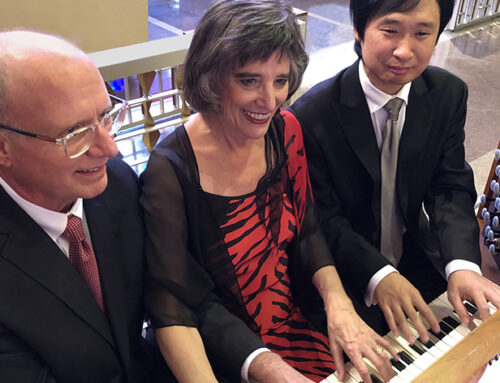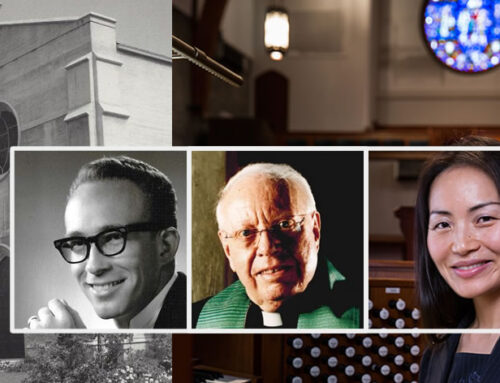As All Saints continued to grow, we began a Sunday morning schedule of two services with choir on All Saints Sunday 1985.
To do that effectively required the birth of a new choir, as one choir with a five-hour Sunday morning commitment every week, would not be sustainable. This is how our current Canterbury Choir was born. It was a “y’all come” sort of affair at the beginning — an outgrowth of people who sang each year in Summer Choir when Coventry Choir was on break. We started out rehearsing a couple Saturdays each month, singing about one Sunday a month, and increasing the time commitment incrementally.
These were fantastic years of personal growth — musically and spiritually. I still kept my membership at Westwood Presbyterian at the time and maintained an arm’s length distance from the Episcopal Church, though I was being nurtured and formed by the liturgy and theology of All Saints.
My experience of being “the other” continued to be important in my spiritual growth, and I feel fortunate that I was brave enough to attend the organizational meeting of what was to become GALAS — Gays and Lesbians of All Saints. It was during this time that I summoned the courage to “come out” to my family. That empowering act was also incredibly painful, especially with the fundamentalist wing of my family. I was upheld and strengthened throughout that journey by this community.
Why is that acceptance so difficult? Everyone is included. All are beloved of God, just as we are. Without question, this sense of inclusion has been a light that has guided my ministry.
In 1991 the church sanctuary was closed the Sunday after Easter for a six-month renovation. We worshiped here in the Forum — four services each Sunday: one with no music, two with choir and one with quartet.
Transition to Director of Music
Without getting into details, we had a bit of a blow-up in the music office that summer and I was summoned back from vacation to help “make it work,” as we used to say. It still makes my head spin to think of what transpired in those four months — keeping the music department ship afloat in pretty rough waters while still worshiping in the forum, mounting our first Homecoming-in-the-Street extravaganza, moving back into the renovated church and rededicating the church in a blaze of glory — following, the next week, with the Mozart Requiem with orchestra on All Saints Sunday. It was a rich and full time.
At the end of that, in mid-November of 1991, George Regas hired me as Director of Music. In 1992, I made the decision to be confirmed and officially became an Episcopalian. It felt like coming home.
In that first program year as Director, I gently shepherded the transition of Canterbury Choir into adulthood, with a weekly rehearsal schedule and audition process.
The ways Canterbury Choir and Coventry Choir have grown over these 20-plus years — not just in numbers, but in commitment, excellence, understanding of mission, and pastoral care in community — is a source of the greatest joy to me.
How 55 people can come into a rehearsal room, week after week, with all the “stuff” of life on their hearts, and, through the rigorous preparation of music, can be united and transformed into an instrument of healing is a miracle.
Welcoming a New Rector
The 1994 to 1995 program year was another monumental season, as we celebrated the long and distinguished tenure of George Regas and welcomed the new rector, Ed Bacon. Permanently imprinted in my memory is my one-on-one meeting with Ed the week he was chosen as rector in January, 1995.
As we sat together in my office he asked, “How are you doing with the transition?” That took me a little off-guard, but I thanked Ed for asking and then proceeded to verbally vomit out all that was going on in my life. In addition to the enormous transitions at All Saints, I was going through a divorce, and my dearest friend had been murdered just months before. It was a tough time to keep positive and hopeful.
Ed was terrific. I say this in all honesty, without even a hint of kissing-up. He communicated how much he was looking forward to working with me and that he wanted me to stay on.
I remember talking about how, at some point in my career, it would be great to work at a place like Grace Cathedral, with magnificent acoustics — but that it almost always meant doing only one type of music, which isn’t of interest to me. And I remember looking the newly-appointed rector in the eye and saying, “So, where else would I go?… I guess I’m stuck here.” Ed laughed and said that I might wish to rephrase that as, “I guess I’m well-rooted here.”
And, Lord Have Mercy, what a wild ride it has been with Ed Bacon these 18 years. Those first few weeks I can remember saying — at least to myself — can we just keep something the same.
I meet with the rector almost every week to plan for liturgies 3-4 weeks in advance. More often than not, these planning sessions lead to theological reflection that will shape and guide our community in worship. I think it is important for you to know that Ed and I have the ability to disagree, which I value highly in our working relationship.
Our liturgical life has been greatly enriched over these years, as we’ve added new repertoire and gone through the often painful process of letting go of hymns and anthems that we may have cherished. And we have added many liturgies over these years: Evensongs, Jazz Vespers, Taize services, Contemplative Eucharists, and the 1 p.m. Spanish service.



Leave A Comment